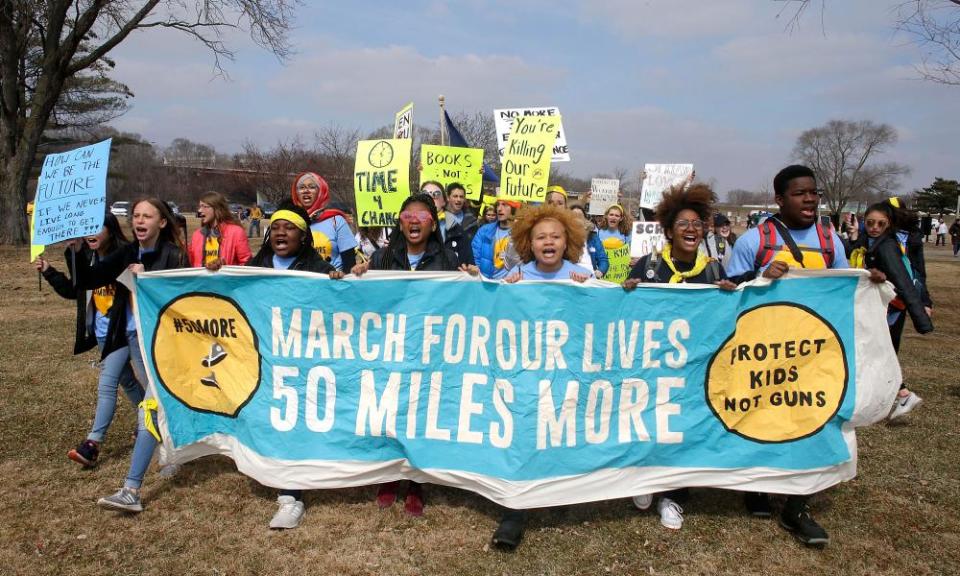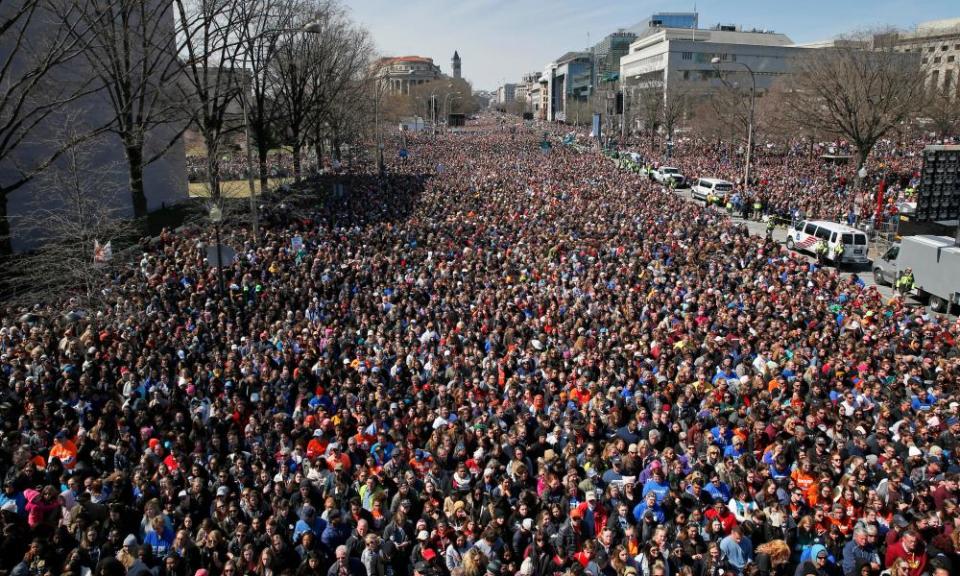Florida school shooting survivors march on unfazed by personal attacks
In the week since the March for Our Lives student activists have rebuffed claims of a secret plan to repeal the second amendment

In the week since they organized a worldwide protest against gun violence, student survivors of the shooting in Parkland, Florida, have faced personal attacks and accusations that they want to repeal the second amendment.
The organizers have stayed focused on their goal: making an impact on the 2018 elections. Less than 48 hours after the March for Our Lives ended, David Hogg, one of the most prominent Marjory Stoneman Douglas student activists, announced a plan to hold town halls across American on 7 April to hold members of Congress accountable for their positions on gun laws. By Friday, they had confirmed events in 30 districts, with a goal of 535, one for every member of Congress.
Gun rights advocates and Donald Trump were quick this week to accuse the student movement of wanting to repeal Americans’ constitutional right to own guns. Trump and the National Rifle Association seized on an op-ed written by the 97-year-old former supreme court justice John Paul Stevens, which argued that activists should organize to “get rid of the second amendment” entirely, thus depriving the NRA of “a propaganda weapon of immense power”.
It’s not (just) about the money. In 2017, the NRA spent at least $4.1m on lobbying – more than the $3.1m it spent in all of 2016. But for comparison, the dairy industry has spent $4.4m in the same period, according to the Center for Responsive Politics (CRP). The National Association of Realtors, one of the biggest spenders, has paid out $32.2m lobbying on housing issues.
The NRA has plenty of cash to spend. It bet big on the 2016 US elections, pouring $14.4m into supporting 44 candidates who won and $34.4m opposing 19 candidates who lost, according to CRP.
But “the real source of its power, I believe, comes from voters,” said Adam Winkler, a UCLA professor of constitutional law.
The 145-year-old organization claims 5 million active members, that number is disputed, but whatever its actual size, membership is a powerful tool, said Robert Spitzer, a professor at the State University of New York at Cortland.
“They have a very powerful ability to mobilize a grassroots support and to engage in politics when most Americans can barely be bothered to vote,” he said. “And because so few Americans do those things, if you get a bunch of people in a locality who are all prepared to go out to a meeting they can have a big effect." Read more
Trump tweeted that repealing the second amendment was, in fact what Democrats wanted to see happen, and that he would fight against it. “NO WAY,” he tweeted, suggesting that Republicans needed to win more seats in the 2018 elections to protect against a potential constitutional change.
“Think they don’t want to ban your guns? Think again,” the NRA warned in a new video, claiming the real goal of the March for Our Lives’ “commonsense gun reform” was “a full repeal of the second amendment and a ban on all guns”.
The student activists pushed back swiftly on Twitter: they did not support repealing the second amendment, they wrote, accusing Trump of stoking unnecessary division.
“March for Our Lives’ position is not to repeal the second amendment, but to effectively address the gun violence issues that our rampant in our country,” the students of March for Our Lives said in a statement.
Their specific demands include universal background checks, investment in public health research, and a ban on a subset of military-style “assault weapons”, as well as on higher-capacity ammunition magazines. These policies do not require a repeal of the second amendment in order to pass. All they need are enough votes in Congress.
When the Fox News host Laura Ingraham tweeted an article about Hogg not being accepted into the colleges he wanted, and claiming that he “whines about it”, the 17-year-old responded by calling for an advertiser boycott of Ingraham’s show, listing some of her advertisers.
By Friday, advocates counted nearly a dozen companies, including Liberty Mutual, Johnson & Johnson and Hulu, that had said Ingraham’s personal attack on a teenage shooting survivor was inappropriate and they would not advertise on her show.

“What has happened in the past week: the gun reform conversation has been won,” said Fred Guttenberg, a Parkland parent whose 14-year-old daughter Jaime was murdered in the shooting. The attacks on student organizers by gun control opponents had a clear meaning, said Guttenberg, a strong proponent of stricter gun control laws. “If you’ve noticed this week, everything they’ve said is a personal attack. That says to me, ‘We’ve lost the argument.’”
“It’s no longer about whether or not commonsense gun reform is a good idea,” Guttenberg said. “Now we go state by state, district by district, and eventually our legislators in DC will pay attention, or we will fire them.”
As they move into their second month of activism in the toxic American gun control debate, the teenage activists continued to show moments of remarkable discipline in their responses.
“My question would be for little Davey Hogg,” a caller identified as Carlos from Mustang, Oklahoma, asked Hogg in a live call on NPR’s On Point Monday. “What are you going to do when the 5 million members of the NRA take up arms against your faction? Because what you’re trying to do is confiscation of firearms. And don’t tell me that that’s not the case.”
Some listeners heard this comment with alarm, as a suggestion of violence against student activists. But Hogg responded live with complete calm. He did not support confiscation of all guns, he explained.
“I want to thank Carlos for making his voice heard,” he said. “I think it’s important that at this discussion that we hear all the sides.”

